【单元考点培优】Unit 3 Our Colorful School Life! 专题05 翻译题-2025-2026学年七年级英语上册单元复习考点培优仁爱科普版(2024)(含答案解析)
文档属性
| 名称 | 【单元考点培优】Unit 3 Our Colorful School Life! 专题05 翻译题-2025-2026学年七年级英语上册单元复习考点培优仁爱科普版(2024)(含答案解析) | 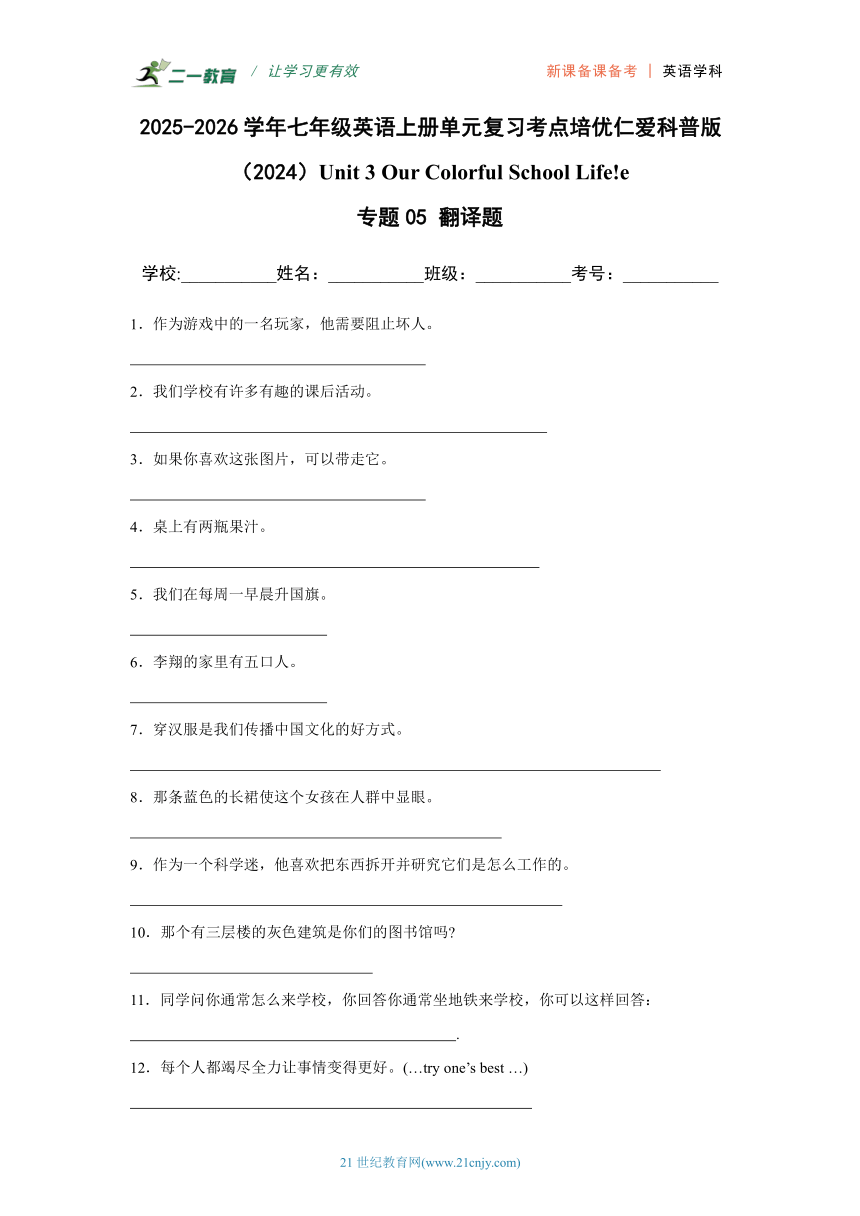 | |
| 格式 | docx | ||
| 文件大小 | 52.5KB | ||
| 资源类型 | 试卷 | ||
| 版本资源 | 仁爱科普版 | ||
| 科目 | 英语 | ||
| 更新时间 | 2025-07-24 18:04:44 | ||
图片预览

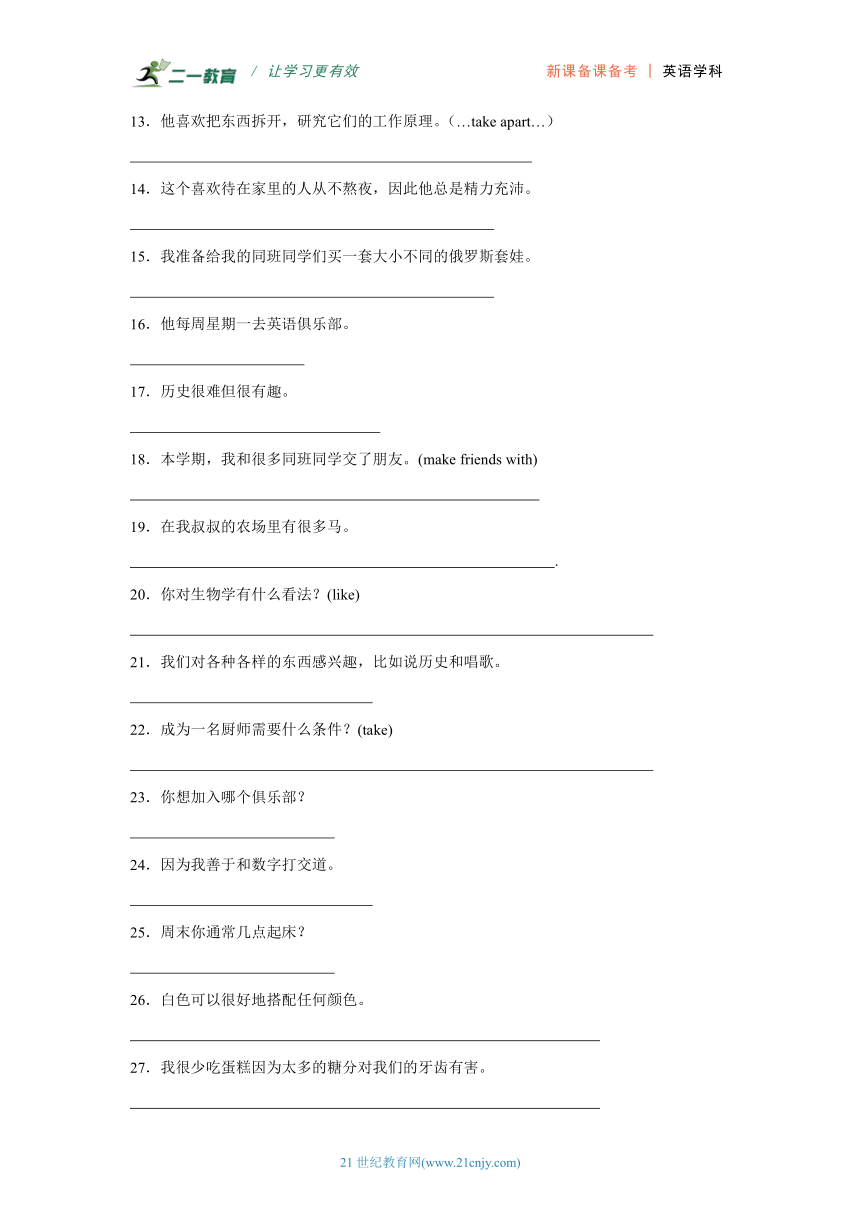
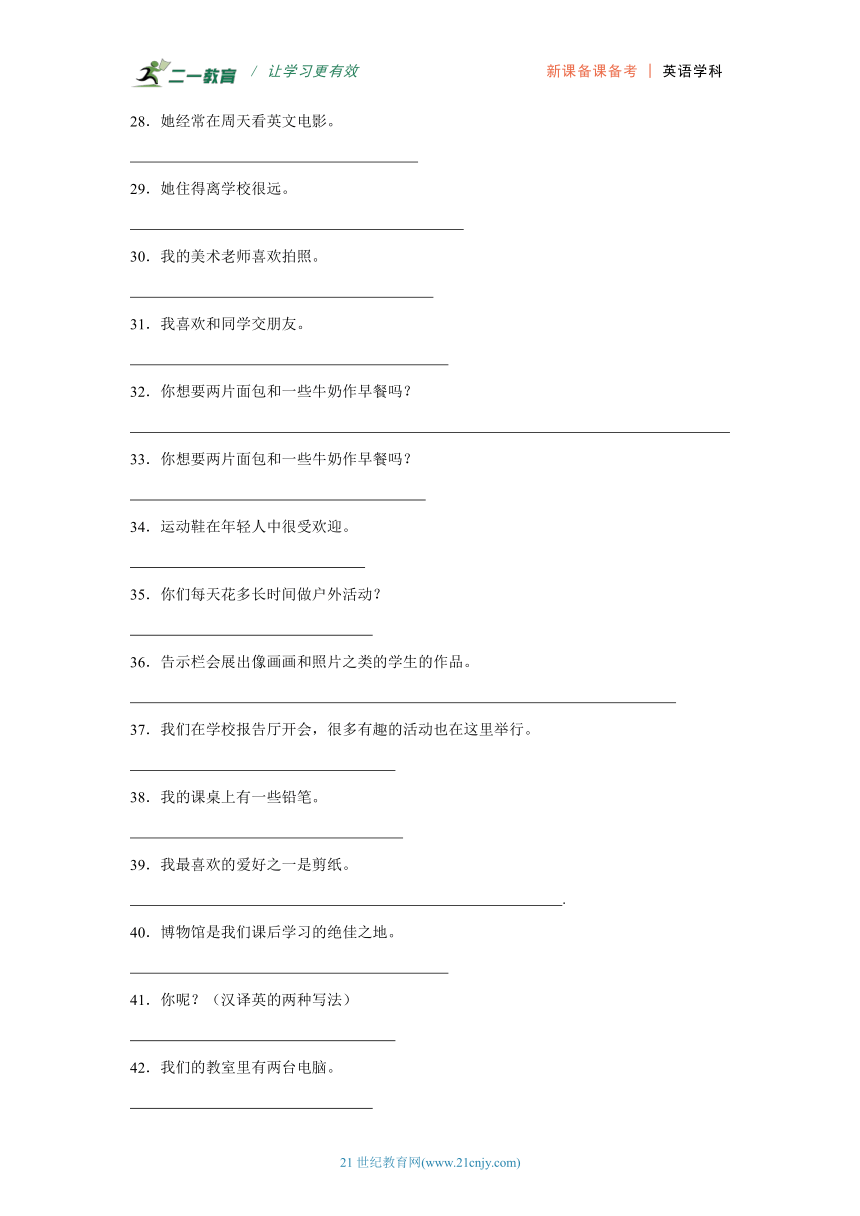
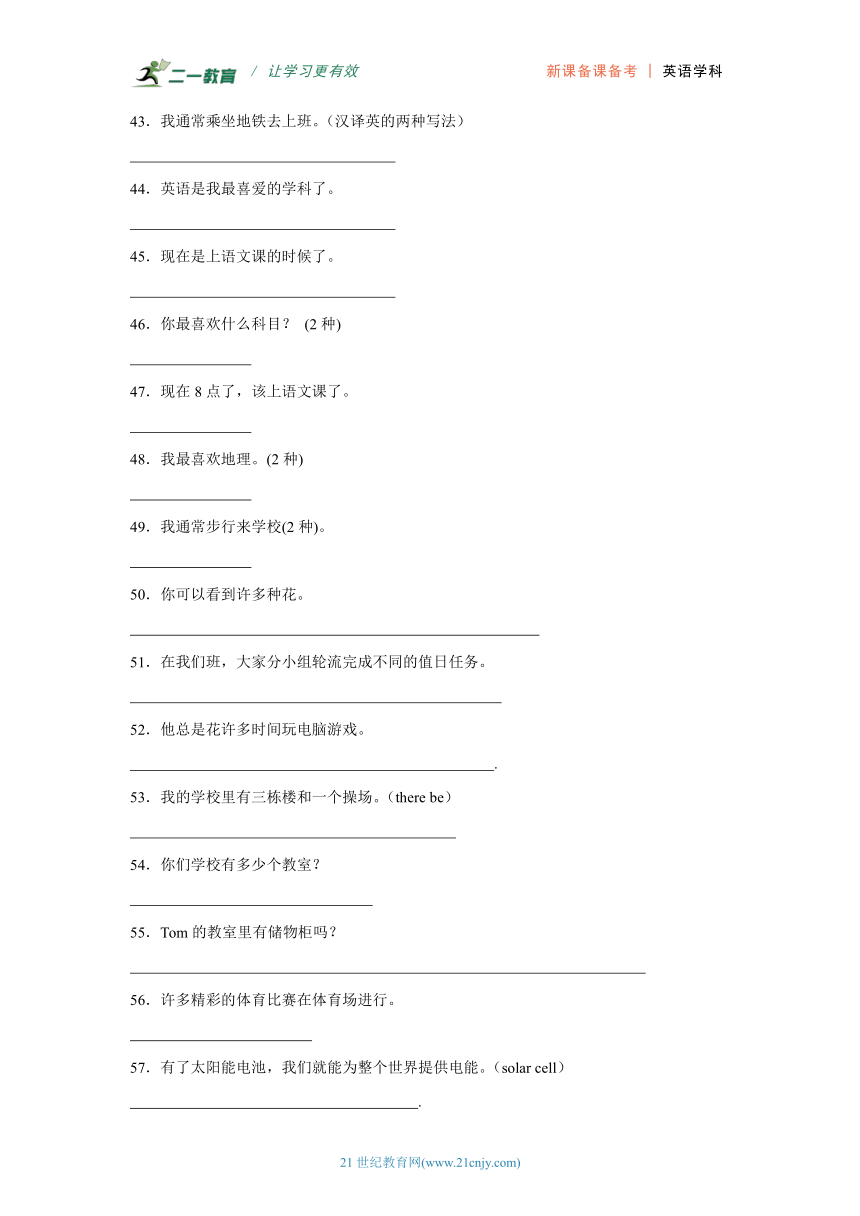
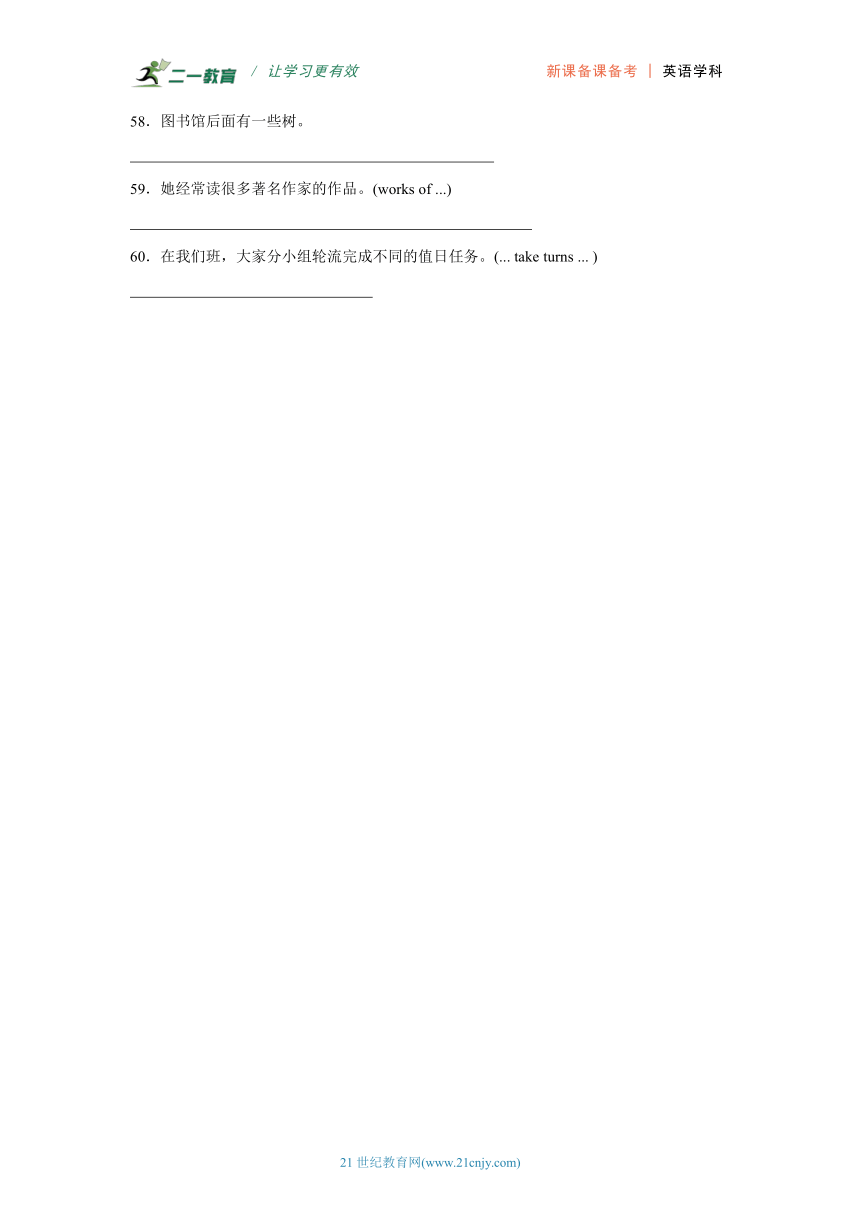
文档简介
/ 让学习更有效 新课备课备考 | 英语学科
/ 让学习更有效 新课备课备考 | 英语学科
2025-2026学年七年级英语上册单元复习考点培优仁爱科普版(2024)Unit 3 Our Colorful School Life!e
专题05 翻译题
学校:___________姓名:___________班级:___________考号:___________
1.作为游戏中的一名玩家,他需要阻止坏人。
2.我们学校有许多有趣的课后活动。
3.如果你喜欢这张图片,可以带走它。
4.桌上有两瓶果汁。
5.我们在每周一早晨升国旗。
6.李翔的家里有五口人。
7.穿汉服是我们传播中国文化的好方式。
8.那条蓝色的长裙使这个女孩在人群中显眼。
9.作为一个科学迷,他喜欢把东西拆开并研究它们是怎么工作的。
10.那个有三层楼的灰色建筑是你们的图书馆吗
11.同学问你通常怎么来学校,你回答你通常坐地铁来学校,你可以这样回答:
.
12.每个人都竭尽全力让事情变得更好。(…try one’s best …)
13.他喜欢把东西拆开,研究它们的工作原理。(…take apart…)
14.这个喜欢待在家里的人从不熬夜,因此他总是精力充沛。
15.我准备给我的同班同学们买一套大小不同的俄罗斯套娃。
16.他每周星期一去英语俱乐部。
17.历史很难但很有趣。
18.本学期,我和很多同班同学交了朋友。(make friends with)
19.在我叔叔的农场里有很多马。
.
20.你对生物学有什么看法?(like)
21.我们对各种各样的东西感兴趣,比如说历史和唱歌。
22.成为一名厨师需要什么条件?(take)
23.你想加入哪个俱乐部?
24.因为我善于和数字打交道。
25.周末你通常几点起床?
26.白色可以很好地搭配任何颜色。
27.我很少吃蛋糕因为太多的糖分对我们的牙齿有害。
28.她经常在周天看英文电影。
29.她住得离学校很远。
30.我的美术老师喜欢拍照。
31.我喜欢和同学交朋友。
32.你想要两片面包和一些牛奶作早餐吗?
33.你想要两片面包和一些牛奶作早餐吗?
34.运动鞋在年轻人中很受欢迎。
35.你们每天花多长时间做户外活动?
36.告示栏会展出像画画和照片之类的学生的作品。
37.我们在学校报告厅开会,很多有趣的活动也在这里举行。
38.我的课桌上有一些铅笔。
39.我最喜欢的爱好之一是剪纸。
.
40.博物馆是我们课后学习的绝佳之地。
41.你呢?(汉译英的两种写法)
42.我们的教室里有两台电脑。
43.我通常乘坐地铁去上班。(汉译英的两种写法)
44.英语是我最喜爱的学科了。
45.现在是上语文课的时候了。
46.你最喜欢什么科目? (2种)
47.现在8点了,该上语文课了。
48.我最喜欢地理。(2种)
49.我通常步行来学校(2种)。
50.你可以看到许多种花。
51.在我们班,大家分小组轮流完成不同的值日任务。
52.他总是花许多时间玩电脑游戏。
.
53.我的学校里有三栋楼和一个操场。(there be)
54.你们学校有多少个教室?
55.Tom的教室里有储物柜吗?
56.许多精彩的体育比赛在体育场进行。
57.有了太阳能电池,我们就能为整个世界提供电能。(solar cell)
.
58.图书馆后面有一些树。
59.她经常读很多著名作家的作品。(works of ...)
60.在我们班,大家分小组轮流完成不同的值日任务。(... take turns ... )
/ 让学习更有效 新课备课备考 | 英语学科
/ 让学习更有效 新课备课备考 | 英语学科
21世纪教育网(www.21cnjy.com)
21世纪教育网(www.21cnjy.com)
参考答案及试题解析
1.As a player in the game, he needs to stop bad people.
【解析】“作为”as;“一名玩家”a player;“在游戏中”in the game,he“他”;“需要做某事”need to do sth.,因为he是第三人称单数,所以need变为needs。“阻止”stop;“坏人”bad people。故填As a player in the game, he needs to stop bad people.
2.There are many interesting after-school activities in our school.
【解析】该句陈述事实,为一般现在时,There are“有”;many interesting after-school activities“许多有趣的课后活动”,作主语;in our school“我们学校”,作状语。故填There are many interesting after-school activities in our school.
3.If you like the picture, you can take it.
【解析】句子是if引导的条件状语从句,从句用一般现在时,“你”you;“喜欢”like;“这张图片”the picture;“可以”can;“带走”take;“它”it。 故填If you like the picture, you can take it.
4.There are two bottles of juice on the table.
【解析】根据汉语提示可知,应用there be句型。two bottles of juice“两瓶果汁”,复数形式,be动词用are;on the table“桌上”。故填There are two bottles of juice on the table.
5.We raise the national flag every Monday morning.
【解析】“我们”英文为we,作主语,表示动作的执行者。“升”国旗常见的表达为raise,在这里它是及物动词,直接跟宾语the national flag“国旗”;“每周一早晨”表达为every Monday morning。根据句意可知,该句描述一般事实,时态为一般现在时态。句子结构为“主语+谓语+宾语+时间状语”。故填We raise the national flag every Monday morning.
6.There are five people in Li Xiang’s family.
【解析】李翔的家里:Li Xiang’s family;五口人:five people。句子表达的是一种客观存在,用“There be” 句型。故填There are five people in Li Xiang’s family.
7.Wearing hanfu is a good way to spread Chinese culture.
【解析】根据题干提示可知,句子为陈述句,且时态为一般现在时;wear hanfu“穿汉服”,此处是抽象的、一般性的行为,应用动名词形式wearing作句子的主语,位于句首,首字母要大写;动名词作主语,谓语be动词应用is;a good way to do sth.“一个做某事的好方法”,动词不定式作后置定语;spread Chinese culture“传播中国文化”。故填Wearing hanfu is a good way to spread Chinese culture.
8.The blue dress makes the girl stand out among people.
【解析】根据句意可知,句子陈述的是客观事实,应用一般现在时;“那条蓝色的长裙”英文表达为the blue dress,句中作主语,为单数,谓语动词应用第三人称单数形式;“这个女孩”英文表达为the girl;make sb do sth意为“使某人做某事”,句中作谓语,make应用第三人称单数形式makes;“显眼”英文表达为stand out;“在人群中”英文表达为among people。故填The blue dress makes the girl stand out among people.
9.As a fan of science, he likes to take things apart and learn how they work.
【解析】作为一个科学迷:As a fan of science;他:he;喜欢把东西拆开:like to take things apart;并:and;研究:learn;它们是怎么工作的:how they work。结合语境可知,此题为一般现在时,主语“he”是第三人称单数,谓语动词用第三人称单数形式“likes”,用来表示“他喜欢”做某事,“take”和“learn”跟在“likes to”后面,用原形。故填As a fan of science, he likes to take things apart and learn how they work.
10.Is the grey building with three floors your library
【解析】那个灰色建筑“the grey building”;有三层楼的“with three floors”;是“be”,句子时态为一般现在时,此处用is,此句为一般疑问句,应放置句首,首字母大写;你们的图书馆“your library”。故填Is the grey building with three floors your library
11.I usually come to school by subway.
【解析】根据题干可知,需要回答“我通常坐地铁来学校”来表达自己的出行方式。本句时态为一般现在时态。句子结构为:主语+副词(频率)+谓语动词+方式状语。“我”英文为“I”;“通常”英文为“usually”;“来学校”英文为“come to school”,是动词短语;“坐地铁”英文为“by subway”,是介词短语。故填I usually come to school by subway.
12.Everybody tries their best to make things better.
【解析】根据题意可知,时态为一般现在时,主语Everybody“每个人”是第三人称单数;try one’s best to do sth“尽某人最大努力去做某事”,动词使用第三人称单数形式,their“他们的”;make things better“让事情变得更好”。故填Everybody tries their best to make things better.
13.He likes to take things apart and study how they work.
【解析】根据句意,本句是一般现在时,主语是第三人称单数he,谓语动词用动词的单三形式;喜欢做某事:like to do sth.,主语是he,谓语动词like用第三人称单数likes;把东西拆开:take things apart,and连接并列成分,研究:study;它们的工作原理:how they work,作宾语。故填He likes to take things apart and study how they work.
14.The person who likes staying at home never stays up late, so he is always full of energy.
【解析】根据中文题干提示可知,句子为陈述句,时态为一般现在时;the person who likes staying at home“这个喜欢待在家里的人”,其中“who likes staying at home”为定语从句,修饰先行词“person”,句首单词首字母要大写;never“从不”,副词,作状语;stay up late“熬夜”,动词短语,主语为第三人称单数,谓语动词应用三单形式stays;so“所以”,连词;he“他”,人称代词主格;be full of “充满”,形容词短语;主语为“he”,be动词应用is;always“总是”,副词;energy“能力,精力”,不可数名词。故填The person who likes staying at home never stays up late, so he is always full of energy.
15.I’m going to buy a set of Russian dolls of different sizes for my classmates.
【解析】根据中文提示可知,该句是肯定句,时态是一般现在时,我:I;打算,表示准备、打算做某事:be going to,这里主语是I,be动词用am;给某人买某物:buy sth for sb;一套:a set of;俄罗斯套娃:Russian dolls;大小不同的:of different sizes,“of +名词”结构作后置定语修饰“Russian dolls”;我的同班同学们:my classmates。故填I’m going to buy a set of Russian dolls of different sizes for my classmates.
16.He goes to the English club every Monday.
【解析】go to the English club“去英语俱乐部”,every Monday“每周一”,此句是一般现在时,主语是he,动词用三单,故填He goes to the English club every Monday.
17.History is difficult/hard but interesting.
【解析】该句是陈述句且是一般现在时。History“历史”;is“是”;difficult/hard“难的”;but“但是”;interesting“有趣的”。故填History is difficult/hard but interesting.
18.I made friends with many classmates this term.
【解析】I“我”;make friends with“和某人交朋友”;classmates“同学”;term“学期”。句子时态是一般过去时,谓语动词用一般过去式。故填I made friends with many classmates this term.
19.There are a lot of/lots of/many horses on my uncle’s farm
【解析】表示“哪里有什么”通常用there be句型。there be有,a lot of/lots of/many很多(都可以修饰可数名词),horse马(可数名词),on one’s farm在……的农场里,my uncle’s我叔叔的;there be句型遵循“就近原则”,本句主语horse应该用复数形式,be动词用are。故填There are a lot of/lots of/many horses on my uncle’s farm。
20.How do you like biology
【解析】本句为特殊疑问句。表达“对……有什么看法”通常用疑问句“How do you like…”;biology“生物学”。故填How do you like biology
21.We are interested in all kinds of things, such as history and singing.
【解析】根据语境可知,时态用一般现在时。be interested in为“对……感兴趣”,主语是we,所以be动词用are;“各种各样的东西”译为“all kinds of things”;比如:such as;历史和唱歌:history and singing。故填 We are interested in all kinds of things, such as history and singing.
22.What does it take to be a cook
【解析】根据所给中文可知,句子时态为一般现在时,句子为特殊疑问句,结合所给词可知,“需要什么条件”what does it take,此处it为形式主语;“成为一名厨师”be a cook,此处应用动词不定式作句子真正的主语。故填What does it take to be a cook
23.What club do you want to join
【解析】what club“哪个俱乐部”;want to do sth“想要做某事”;join“加入”。句子是一般现在时,主语you是第二人称,疑问句借助于助动词do,放在主语前,故填What club do you want to join
24.Because I’m good with numbers.
【解析】因为“because”,句首首字母大写;我“I”;善于和……打交道“be good with…”,句子时态为一般现在时,此处be动词用am;数字“numbers”,用复数形式,表示概数概念。故填Because I’m good with numbers.
25.What time do you usually get up on weekends
【解析】几点:what time;句子用一般现在时,主语是you,变疑问句时借助助动词do,放主语之前,其后加动词原形;起床:get up;通常:usually,放动词之前;在周末:on weekends。故填What time do you usually get up on weekends
26.White can match any colour very well.
【解析】描述事实用一般现在时。“白色”用white,作主语,位于句首首字母大写;“可以”用can,后接动词原形;“搭配”用match,动词;“任何颜色”用any colour;“很好地”用very well,副词短语修饰动词match作状语,置于句尾。故填White can match any colour very well.
27.I seldom eat cakes because too much sugar is bad for our teeth.
【解析】I“我”;seldom“很少”,频度副词放在实义动词之前,时态为一般现在时;eat cakes“吃蛋糕”;because“因为”;too much sugar“太多的糖分”,不可数名词作从句主语;be bad for“对……有害”,be动词用is;our teeth“我们的牙齿”,故填I seldom eat cakes because too much sugar is bad for our teeth.
28.She often watches English movies on Sunday.
【解析】她she,经常often,在周天on Sunday,看英文电影watch English movies。时态是一般现在时,主语是第三人称单数,动词用三单。故填She often watches English movies on Sunday.
29.She lives far away from the school.
【解析】she“她”,作主语;live“居住”,动词;根据汉语意思,谓语动词要用一般现在时,表示经常性动作;主语为she,动词live要用三单lives;far away from表示“离……远”;the school“学校”,作from的宾语。故填She lives far away from the school.
30.My art teacher likes taking photos.
【解析】我的美术老师:my art teacher;喜欢做某事:like doing sth.;拍照:take photos。时态为一般现在时,主语是第三人称单数,因此谓语动词like需要变三单likes;likes之后跟动名词作宾语,因此take变成动名词taking;句首首字母大写。故填My art teacher likes taking photos.
31.I like making friends with my classmates.
【解析】I“我”;like doing sth“喜欢做某事”,时态是一般现在时,主语是I,动词用原形;make friends with sb“和某人交朋友”;my classmates“同学们”。故填I like making friends with my classmates.
32.Would you like two pieces of bread and some milk for breakfast
【解析】分析句子可知,本句为一般疑问句。你:you,主语;想要某物:would like sth,变疑问句时把would放主语you之前,首字母大写;两片面包:two pieces of bread;和:and;一些牛奶:some milk,此处希望得到对方的肯定回答,用some不用any;作为早餐:for breakfast。故填Would you like two pieces of bread and some milk for breakfast
33.Would you like two pieces of bread and some milk for breakfast
【解析】想要某物:would like sth.,变疑问句时把would放主语you之前;两片面包:two pieces of bread;一些牛奶:some milk,此处希望得到对方的肯定回答,疑问句中用some;作为早餐:for breakfast。故填Would you like two pieces of bread and some milk for breakfast
34.Trainers are popular among young people.
【解析】trainer“运动鞋”,be popular“很受欢迎”,among young people“在年轻人中”,句子应用一般现在时,主语用trainer的复数形式trainers表示种类,be动词用are。故填Trainers are popular among young people.
35.How long do you spend doing/on outdoor activities every day /How long does it take you to do outdoor activities every day
【解析】多长时间:how long,引导特殊疑问句,句首首字母大写;你们:you;花时间做某事:spend time doing/on sth.;户外活动:outdoor activities;每天:every day,句子时态为一般现在时,此处应借助助动词do构成疑问句,放置疑问词后;it takes sb.+time+to do sth.“做某事花费某人时间”,是固定句式,改为特殊疑问句时,需借助助动词does,放置疑问词后。故填How long do you spend doing/on outdoor activities every day /How long does it take you to do outdoor activities every day
36.The noticeboards will show students’ works, like paintings and photos.
【解析】noticeboard“告示栏”,此处表示不止一个告示栏,因此用复数名词;show“展示”,此处表示将会展示,因此用一般将来时,students’ works“学生的作品”,like“像”,painting and photo“画画和照片”,此处表示不止一张照片和画,因此用复数名词;故填The noticeboards will show students’ works, like paintings and photos.
37.We have meetings in the school hall, and many/a lot of interesting events take place there too.
【解析】we“我们”,作主语;have meetings“开会”;in the school hall“在学校报告厅”;many/a lot of interesting events“很多有趣的活动”,作主语;take place there too“也在这里举行”。句子叙述事实,用一般现在时,主语是“we”以及名词复数“events”,因此谓语动词均用原形;且两个句子之间是顺承关系,可用and连接。故填We have meetings in the school hall, and many/a lot of interesting events take place there too.
38.There are some pencils on my desk.
【解析】时态为一般现在时,There be“有”;主语是复数some pencils“一些铅笔”,be动词用are;on my desk“在我的课桌上”。故填There are some pencils on my desk.
39.One of my favorite hobbies is paper cutting.
【解析】根据语境可知,句子用一般现在时,主语是one of my favorite hobbies“我最喜欢的爱好之一”,be动词用is,表语是paper cutting“剪纸”。故填One of my favorite hobbies is paper cutting.
40.Museums are the perfect places for us to learn after class.
【解析】博物馆:museum,此处应用其复数形式,表泛指;是:be;做某事的绝佳之地:the perfect places to do sth;学习:learn;课后:after class;for us“对我们来说”。结合语境可知,句子时态为一般现在时,主语museums为复数,故谓语动词应用are。故填Museums are the perfect places for us to learn after class.
41.How about you?/ What about you
【解析】How about.../What about...表示 “……怎么样;……呢?”,you表示 “你”。故填How about you?/ What about you
42.There are two computers in our classroom.
【解析】本句用there be句型表示“某地有某物”,时态是一般现在时,主语是two computers“两台电脑”,为复数,be动词应用are;in our classroom“在我们的教室”。故填There are two computers in our classroom.
43.I usually go to work by subway. / I usually take the subway to work.
【解析】I“我”,作主语;usually “通常”,频度副词;go to work“去上班”,动词短语作谓语;by subway“乘坐地铁”,介词短语作状语,即“I usually go to work by subway.” 符合题意。
I“我”,作主语;usually “通常”,频度副词;take the subway“乘坐地铁”,动词短语作谓语;to work“去上班”。即“I usually take the subway to work.” 符合题意。故填I usually go to work by subway./ I usually take the subway to work.“我通常乘坐地铁去上班。”
44.English is my favorite subject.
【解析】根据题意可知,该句的时态为一般现在时,English“英语”第三人称单数作主语;is“是”;my favorite subject“我最爱的学科”。故填English is my favorite subject.
45.It’s time to have the Chinese class now.
【解析】时态为一般现在时,It’s time to do sth“是做……的时候”;have the Chinese class“上语文课”;now“现在”。故填It’s time to have the Chinese class now.
46.What’s your favorite subject /What subject do you like best
【解析】“你最喜欢什么科目”用两种英文表达方式,第一种用“favorite”表示“最喜欢的”,用“What’s your favorite subject ”表示;第二种用“like best”表示“最喜欢”,形成疑问句为“What subject do you like best ”。故填What’s your favorite subject /What subject do you like best
47.It’s eight o’clock. It’s time for Chinese class.
【解析】It’s eight o’clock表示“8点了”,It’s time for sth“该做某事的时候”,Chinese class“语文课”。故填It’s eight o’clock. It’s time for Chinese class.
48.I like geography best./My favorite subject is geography.
【解析】本句可用like best“最喜欢”或favorite subject“最喜欢的科目”,geography“地理”。故填I like geography best./My favorite subject is geography.
49.I usually go to school on foot./I usually walk to school.
【解析】根据汉语提示可知,此处时态是一般现在时,主语是I,副词usually“通常”,go to school“去学校”,on foot“步行”,walk to school“步行去学校”。故填I usually go to school on foot./I usually walk to school.
50.You can see many kinds of flowers.
【解析】你:you;能:can,情态动词后加动词原形see“看到”;许多种:many kinds of;花:flowers。故填You can see many kinds of flowers.
51.In our class, we work in groups and take turns to do different chores.
【解析】in our class“在我们班”;we“我们”;work in groups“大家分小组”,时态为一般现在时,主语为we,应用动词原形;and“然后”;take turns“轮流”;to do“完成”;different chores“不同的值日任务”。故填In our class, we work in groups and take turns to do different chores.
52.He always spends much/a lot of/ lots of time on computer games./ He always spends much/a lot of/ lots of time (in) playing computer games.
【解析】spend time on sth表示“在某事上花费时间”。on后面直接接所花费时间从事的活动,即computer games;spend time (in) doing sth同样表示“花费时间做某事”。in可以省略,后面接动词的-ing形式,即playing,所以是spends…time (in) playing computer games;always是频度副词,表示“总是”,放在实义动词spends之前,much,a lot of,lots of都可以用来修饰不可数名词time,表示“许多的”。故答案为:He always spends much/a lot of/ lots of time on computer games./ He always spends much/a lot of/ lots of time (in) playing computer games.
53.There are three buildings and a playground in my school.
【解析】There be“有”:a playground“一个操场”;three buildings“三栋楼”,there be遵循“就近原则”,离be动词最近的名词buildings是复数形式,be动词用are,in my school“在我学校”,故填There are three buildings and a playground in my school.
54.How many classrooms are there in your school/ How many classrooms does your school have
【解析】classroom“教室”,为可数名词,此处用how many提问数量,句首首字母大写,classroom用复数形式;there are“有”,此处are应放置疑问词后,构成特殊疑问句;in your school“在你们学校”;或者your school“你们学校”,主语;have“有”,实义动词,应借助助动词does,构成特殊疑问句,放置主语前。故填How many classrooms are there in your school/ How many classrooms does your school have
55.Are there any lockers in Tom’s classroom
【解析】分析题干可知,句子为一般疑问句,且时态为一般现在时,考查there be句型;locker“储物柜”,可数名词;教室里的储物柜应该有一些,即some lockers,变成问句时,some改为any;主语“any lockers”为第三人称复数,be动词用are,置于句首,首字母要大写;in Tom’s classroom“在Tom的教室里”,介词短语。故填Are there any lockers in Tom’s classroom
56.Lots of/Many exciting/wonderful sports matches take place on the sports field.
【解析】lots of/many“许多”,后跟可数名词复数;exciting/wonderful sports matches“精彩的比赛”;take place“进行,举行”;on the sports field“在体育场”。时态为一般现在时,主语是复数,动词用原形。故填Lots of/Many exciting/wonderful sports matches take place on the sports field.
57.With solar cells, we can power the entire world
【解析】with solar cells“有了太阳能电池”,we“我们”,can“能”,是情态动词,后面接动词原形,power“为……提供电能”,the entire world“整个世界”,故填With solar cells, we can power the entire world。
58.There are some trees behind the library.
【解析】该句可以用there be句型表达,且为一般现在时。There are有;some一些;trees树;behind在……的后面;the library图书馆。故填There are some trees behind the library.
59.She often reads the works of many famous writers.
【解析】她:She;经常:often;读:read;作品:work ;……的:of ;很多:many;著名的:famous;作家:writer。主语是She,时态为一般现在时,谓语应用三单形式reads。writer前有many修饰,应用复数形式writers。work也应用复数works,表示特指,前面需要加定冠词the。故填She often reads the works of many famous writers.
60.In our class, everyone takes turns to complete different duty tasks in groups.
【解析】在我们班“in our class”,句首首字母大写;大家“everyone”;轮流做某事“take turns to do sth.”,时态为一般现在时,此处用三单形式;完成“complete”;不同的值日任务“different duty tasks”;分小组“in groups”。故填In our class, everyone takes turns to complete different duty tasks in groups.
21世纪教育网(www.21cnjy.com)
21世纪教育网(www.21cnjy.com)
/ 让学习更有效 新课备课备考 | 英语学科
2025-2026学年七年级英语上册单元复习考点培优仁爱科普版(2024)Unit 3 Our Colorful School Life!e
专题05 翻译题
学校:___________姓名:___________班级:___________考号:___________
1.作为游戏中的一名玩家,他需要阻止坏人。
2.我们学校有许多有趣的课后活动。
3.如果你喜欢这张图片,可以带走它。
4.桌上有两瓶果汁。
5.我们在每周一早晨升国旗。
6.李翔的家里有五口人。
7.穿汉服是我们传播中国文化的好方式。
8.那条蓝色的长裙使这个女孩在人群中显眼。
9.作为一个科学迷,他喜欢把东西拆开并研究它们是怎么工作的。
10.那个有三层楼的灰色建筑是你们的图书馆吗
11.同学问你通常怎么来学校,你回答你通常坐地铁来学校,你可以这样回答:
.
12.每个人都竭尽全力让事情变得更好。(…try one’s best …)
13.他喜欢把东西拆开,研究它们的工作原理。(…take apart…)
14.这个喜欢待在家里的人从不熬夜,因此他总是精力充沛。
15.我准备给我的同班同学们买一套大小不同的俄罗斯套娃。
16.他每周星期一去英语俱乐部。
17.历史很难但很有趣。
18.本学期,我和很多同班同学交了朋友。(make friends with)
19.在我叔叔的农场里有很多马。
.
20.你对生物学有什么看法?(like)
21.我们对各种各样的东西感兴趣,比如说历史和唱歌。
22.成为一名厨师需要什么条件?(take)
23.你想加入哪个俱乐部?
24.因为我善于和数字打交道。
25.周末你通常几点起床?
26.白色可以很好地搭配任何颜色。
27.我很少吃蛋糕因为太多的糖分对我们的牙齿有害。
28.她经常在周天看英文电影。
29.她住得离学校很远。
30.我的美术老师喜欢拍照。
31.我喜欢和同学交朋友。
32.你想要两片面包和一些牛奶作早餐吗?
33.你想要两片面包和一些牛奶作早餐吗?
34.运动鞋在年轻人中很受欢迎。
35.你们每天花多长时间做户外活动?
36.告示栏会展出像画画和照片之类的学生的作品。
37.我们在学校报告厅开会,很多有趣的活动也在这里举行。
38.我的课桌上有一些铅笔。
39.我最喜欢的爱好之一是剪纸。
.
40.博物馆是我们课后学习的绝佳之地。
41.你呢?(汉译英的两种写法)
42.我们的教室里有两台电脑。
43.我通常乘坐地铁去上班。(汉译英的两种写法)
44.英语是我最喜爱的学科了。
45.现在是上语文课的时候了。
46.你最喜欢什么科目? (2种)
47.现在8点了,该上语文课了。
48.我最喜欢地理。(2种)
49.我通常步行来学校(2种)。
50.你可以看到许多种花。
51.在我们班,大家分小组轮流完成不同的值日任务。
52.他总是花许多时间玩电脑游戏。
.
53.我的学校里有三栋楼和一个操场。(there be)
54.你们学校有多少个教室?
55.Tom的教室里有储物柜吗?
56.许多精彩的体育比赛在体育场进行。
57.有了太阳能电池,我们就能为整个世界提供电能。(solar cell)
.
58.图书馆后面有一些树。
59.她经常读很多著名作家的作品。(works of ...)
60.在我们班,大家分小组轮流完成不同的值日任务。(... take turns ... )
/ 让学习更有效 新课备课备考 | 英语学科
/ 让学习更有效 新课备课备考 | 英语学科
21世纪教育网(www.21cnjy.com)
21世纪教育网(www.21cnjy.com)
参考答案及试题解析
1.As a player in the game, he needs to stop bad people.
【解析】“作为”as;“一名玩家”a player;“在游戏中”in the game,he“他”;“需要做某事”need to do sth.,因为he是第三人称单数,所以need变为needs。“阻止”stop;“坏人”bad people。故填As a player in the game, he needs to stop bad people.
2.There are many interesting after-school activities in our school.
【解析】该句陈述事实,为一般现在时,There are“有”;many interesting after-school activities“许多有趣的课后活动”,作主语;in our school“我们学校”,作状语。故填There are many interesting after-school activities in our school.
3.If you like the picture, you can take it.
【解析】句子是if引导的条件状语从句,从句用一般现在时,“你”you;“喜欢”like;“这张图片”the picture;“可以”can;“带走”take;“它”it。 故填If you like the picture, you can take it.
4.There are two bottles of juice on the table.
【解析】根据汉语提示可知,应用there be句型。two bottles of juice“两瓶果汁”,复数形式,be动词用are;on the table“桌上”。故填There are two bottles of juice on the table.
5.We raise the national flag every Monday morning.
【解析】“我们”英文为we,作主语,表示动作的执行者。“升”国旗常见的表达为raise,在这里它是及物动词,直接跟宾语the national flag“国旗”;“每周一早晨”表达为every Monday morning。根据句意可知,该句描述一般事实,时态为一般现在时态。句子结构为“主语+谓语+宾语+时间状语”。故填We raise the national flag every Monday morning.
6.There are five people in Li Xiang’s family.
【解析】李翔的家里:Li Xiang’s family;五口人:five people。句子表达的是一种客观存在,用“There be” 句型。故填There are five people in Li Xiang’s family.
7.Wearing hanfu is a good way to spread Chinese culture.
【解析】根据题干提示可知,句子为陈述句,且时态为一般现在时;wear hanfu“穿汉服”,此处是抽象的、一般性的行为,应用动名词形式wearing作句子的主语,位于句首,首字母要大写;动名词作主语,谓语be动词应用is;a good way to do sth.“一个做某事的好方法”,动词不定式作后置定语;spread Chinese culture“传播中国文化”。故填Wearing hanfu is a good way to spread Chinese culture.
8.The blue dress makes the girl stand out among people.
【解析】根据句意可知,句子陈述的是客观事实,应用一般现在时;“那条蓝色的长裙”英文表达为the blue dress,句中作主语,为单数,谓语动词应用第三人称单数形式;“这个女孩”英文表达为the girl;make sb do sth意为“使某人做某事”,句中作谓语,make应用第三人称单数形式makes;“显眼”英文表达为stand out;“在人群中”英文表达为among people。故填The blue dress makes the girl stand out among people.
9.As a fan of science, he likes to take things apart and learn how they work.
【解析】作为一个科学迷:As a fan of science;他:he;喜欢把东西拆开:like to take things apart;并:and;研究:learn;它们是怎么工作的:how they work。结合语境可知,此题为一般现在时,主语“he”是第三人称单数,谓语动词用第三人称单数形式“likes”,用来表示“他喜欢”做某事,“take”和“learn”跟在“likes to”后面,用原形。故填As a fan of science, he likes to take things apart and learn how they work.
10.Is the grey building with three floors your library
【解析】那个灰色建筑“the grey building”;有三层楼的“with three floors”;是“be”,句子时态为一般现在时,此处用is,此句为一般疑问句,应放置句首,首字母大写;你们的图书馆“your library”。故填Is the grey building with three floors your library
11.I usually come to school by subway.
【解析】根据题干可知,需要回答“我通常坐地铁来学校”来表达自己的出行方式。本句时态为一般现在时态。句子结构为:主语+副词(频率)+谓语动词+方式状语。“我”英文为“I”;“通常”英文为“usually”;“来学校”英文为“come to school”,是动词短语;“坐地铁”英文为“by subway”,是介词短语。故填I usually come to school by subway.
12.Everybody tries their best to make things better.
【解析】根据题意可知,时态为一般现在时,主语Everybody“每个人”是第三人称单数;try one’s best to do sth“尽某人最大努力去做某事”,动词使用第三人称单数形式,their“他们的”;make things better“让事情变得更好”。故填Everybody tries their best to make things better.
13.He likes to take things apart and study how they work.
【解析】根据句意,本句是一般现在时,主语是第三人称单数he,谓语动词用动词的单三形式;喜欢做某事:like to do sth.,主语是he,谓语动词like用第三人称单数likes;把东西拆开:take things apart,and连接并列成分,研究:study;它们的工作原理:how they work,作宾语。故填He likes to take things apart and study how they work.
14.The person who likes staying at home never stays up late, so he is always full of energy.
【解析】根据中文题干提示可知,句子为陈述句,时态为一般现在时;the person who likes staying at home“这个喜欢待在家里的人”,其中“who likes staying at home”为定语从句,修饰先行词“person”,句首单词首字母要大写;never“从不”,副词,作状语;stay up late“熬夜”,动词短语,主语为第三人称单数,谓语动词应用三单形式stays;so“所以”,连词;he“他”,人称代词主格;be full of “充满”,形容词短语;主语为“he”,be动词应用is;always“总是”,副词;energy“能力,精力”,不可数名词。故填The person who likes staying at home never stays up late, so he is always full of energy.
15.I’m going to buy a set of Russian dolls of different sizes for my classmates.
【解析】根据中文提示可知,该句是肯定句,时态是一般现在时,我:I;打算,表示准备、打算做某事:be going to,这里主语是I,be动词用am;给某人买某物:buy sth for sb;一套:a set of;俄罗斯套娃:Russian dolls;大小不同的:of different sizes,“of +名词”结构作后置定语修饰“Russian dolls”;我的同班同学们:my classmates。故填I’m going to buy a set of Russian dolls of different sizes for my classmates.
16.He goes to the English club every Monday.
【解析】go to the English club“去英语俱乐部”,every Monday“每周一”,此句是一般现在时,主语是he,动词用三单,故填He goes to the English club every Monday.
17.History is difficult/hard but interesting.
【解析】该句是陈述句且是一般现在时。History“历史”;is“是”;difficult/hard“难的”;but“但是”;interesting“有趣的”。故填History is difficult/hard but interesting.
18.I made friends with many classmates this term.
【解析】I“我”;make friends with“和某人交朋友”;classmates“同学”;term“学期”。句子时态是一般过去时,谓语动词用一般过去式。故填I made friends with many classmates this term.
19.There are a lot of/lots of/many horses on my uncle’s farm
【解析】表示“哪里有什么”通常用there be句型。there be有,a lot of/lots of/many很多(都可以修饰可数名词),horse马(可数名词),on one’s farm在……的农场里,my uncle’s我叔叔的;there be句型遵循“就近原则”,本句主语horse应该用复数形式,be动词用are。故填There are a lot of/lots of/many horses on my uncle’s farm。
20.How do you like biology
【解析】本句为特殊疑问句。表达“对……有什么看法”通常用疑问句“How do you like…”;biology“生物学”。故填How do you like biology
21.We are interested in all kinds of things, such as history and singing.
【解析】根据语境可知,时态用一般现在时。be interested in为“对……感兴趣”,主语是we,所以be动词用are;“各种各样的东西”译为“all kinds of things”;比如:such as;历史和唱歌:history and singing。故填 We are interested in all kinds of things, such as history and singing.
22.What does it take to be a cook
【解析】根据所给中文可知,句子时态为一般现在时,句子为特殊疑问句,结合所给词可知,“需要什么条件”what does it take,此处it为形式主语;“成为一名厨师”be a cook,此处应用动词不定式作句子真正的主语。故填What does it take to be a cook
23.What club do you want to join
【解析】what club“哪个俱乐部”;want to do sth“想要做某事”;join“加入”。句子是一般现在时,主语you是第二人称,疑问句借助于助动词do,放在主语前,故填What club do you want to join
24.Because I’m good with numbers.
【解析】因为“because”,句首首字母大写;我“I”;善于和……打交道“be good with…”,句子时态为一般现在时,此处be动词用am;数字“numbers”,用复数形式,表示概数概念。故填Because I’m good with numbers.
25.What time do you usually get up on weekends
【解析】几点:what time;句子用一般现在时,主语是you,变疑问句时借助助动词do,放主语之前,其后加动词原形;起床:get up;通常:usually,放动词之前;在周末:on weekends。故填What time do you usually get up on weekends
26.White can match any colour very well.
【解析】描述事实用一般现在时。“白色”用white,作主语,位于句首首字母大写;“可以”用can,后接动词原形;“搭配”用match,动词;“任何颜色”用any colour;“很好地”用very well,副词短语修饰动词match作状语,置于句尾。故填White can match any colour very well.
27.I seldom eat cakes because too much sugar is bad for our teeth.
【解析】I“我”;seldom“很少”,频度副词放在实义动词之前,时态为一般现在时;eat cakes“吃蛋糕”;because“因为”;too much sugar“太多的糖分”,不可数名词作从句主语;be bad for“对……有害”,be动词用is;our teeth“我们的牙齿”,故填I seldom eat cakes because too much sugar is bad for our teeth.
28.She often watches English movies on Sunday.
【解析】她she,经常often,在周天on Sunday,看英文电影watch English movies。时态是一般现在时,主语是第三人称单数,动词用三单。故填She often watches English movies on Sunday.
29.She lives far away from the school.
【解析】she“她”,作主语;live“居住”,动词;根据汉语意思,谓语动词要用一般现在时,表示经常性动作;主语为she,动词live要用三单lives;far away from表示“离……远”;the school“学校”,作from的宾语。故填She lives far away from the school.
30.My art teacher likes taking photos.
【解析】我的美术老师:my art teacher;喜欢做某事:like doing sth.;拍照:take photos。时态为一般现在时,主语是第三人称单数,因此谓语动词like需要变三单likes;likes之后跟动名词作宾语,因此take变成动名词taking;句首首字母大写。故填My art teacher likes taking photos.
31.I like making friends with my classmates.
【解析】I“我”;like doing sth“喜欢做某事”,时态是一般现在时,主语是I,动词用原形;make friends with sb“和某人交朋友”;my classmates“同学们”。故填I like making friends with my classmates.
32.Would you like two pieces of bread and some milk for breakfast
【解析】分析句子可知,本句为一般疑问句。你:you,主语;想要某物:would like sth,变疑问句时把would放主语you之前,首字母大写;两片面包:two pieces of bread;和:and;一些牛奶:some milk,此处希望得到对方的肯定回答,用some不用any;作为早餐:for breakfast。故填Would you like two pieces of bread and some milk for breakfast
33.Would you like two pieces of bread and some milk for breakfast
【解析】想要某物:would like sth.,变疑问句时把would放主语you之前;两片面包:two pieces of bread;一些牛奶:some milk,此处希望得到对方的肯定回答,疑问句中用some;作为早餐:for breakfast。故填Would you like two pieces of bread and some milk for breakfast
34.Trainers are popular among young people.
【解析】trainer“运动鞋”,be popular“很受欢迎”,among young people“在年轻人中”,句子应用一般现在时,主语用trainer的复数形式trainers表示种类,be动词用are。故填Trainers are popular among young people.
35.How long do you spend doing/on outdoor activities every day /How long does it take you to do outdoor activities every day
【解析】多长时间:how long,引导特殊疑问句,句首首字母大写;你们:you;花时间做某事:spend time doing/on sth.;户外活动:outdoor activities;每天:every day,句子时态为一般现在时,此处应借助助动词do构成疑问句,放置疑问词后;it takes sb.+time+to do sth.“做某事花费某人时间”,是固定句式,改为特殊疑问句时,需借助助动词does,放置疑问词后。故填How long do you spend doing/on outdoor activities every day /How long does it take you to do outdoor activities every day
36.The noticeboards will show students’ works, like paintings and photos.
【解析】noticeboard“告示栏”,此处表示不止一个告示栏,因此用复数名词;show“展示”,此处表示将会展示,因此用一般将来时,students’ works“学生的作品”,like“像”,painting and photo“画画和照片”,此处表示不止一张照片和画,因此用复数名词;故填The noticeboards will show students’ works, like paintings and photos.
37.We have meetings in the school hall, and many/a lot of interesting events take place there too.
【解析】we“我们”,作主语;have meetings“开会”;in the school hall“在学校报告厅”;many/a lot of interesting events“很多有趣的活动”,作主语;take place there too“也在这里举行”。句子叙述事实,用一般现在时,主语是“we”以及名词复数“events”,因此谓语动词均用原形;且两个句子之间是顺承关系,可用and连接。故填We have meetings in the school hall, and many/a lot of interesting events take place there too.
38.There are some pencils on my desk.
【解析】时态为一般现在时,There be“有”;主语是复数some pencils“一些铅笔”,be动词用are;on my desk“在我的课桌上”。故填There are some pencils on my desk.
39.One of my favorite hobbies is paper cutting.
【解析】根据语境可知,句子用一般现在时,主语是one of my favorite hobbies“我最喜欢的爱好之一”,be动词用is,表语是paper cutting“剪纸”。故填One of my favorite hobbies is paper cutting.
40.Museums are the perfect places for us to learn after class.
【解析】博物馆:museum,此处应用其复数形式,表泛指;是:be;做某事的绝佳之地:the perfect places to do sth;学习:learn;课后:after class;for us“对我们来说”。结合语境可知,句子时态为一般现在时,主语museums为复数,故谓语动词应用are。故填Museums are the perfect places for us to learn after class.
41.How about you?/ What about you
【解析】How about.../What about...表示 “……怎么样;……呢?”,you表示 “你”。故填How about you?/ What about you
42.There are two computers in our classroom.
【解析】本句用there be句型表示“某地有某物”,时态是一般现在时,主语是two computers“两台电脑”,为复数,be动词应用are;in our classroom“在我们的教室”。故填There are two computers in our classroom.
43.I usually go to work by subway. / I usually take the subway to work.
【解析】I“我”,作主语;usually “通常”,频度副词;go to work“去上班”,动词短语作谓语;by subway“乘坐地铁”,介词短语作状语,即“I usually go to work by subway.” 符合题意。
I“我”,作主语;usually “通常”,频度副词;take the subway“乘坐地铁”,动词短语作谓语;to work“去上班”。即“I usually take the subway to work.” 符合题意。故填I usually go to work by subway./ I usually take the subway to work.“我通常乘坐地铁去上班。”
44.English is my favorite subject.
【解析】根据题意可知,该句的时态为一般现在时,English“英语”第三人称单数作主语;is“是”;my favorite subject“我最爱的学科”。故填English is my favorite subject.
45.It’s time to have the Chinese class now.
【解析】时态为一般现在时,It’s time to do sth“是做……的时候”;have the Chinese class“上语文课”;now“现在”。故填It’s time to have the Chinese class now.
46.What’s your favorite subject /What subject do you like best
【解析】“你最喜欢什么科目”用两种英文表达方式,第一种用“favorite”表示“最喜欢的”,用“What’s your favorite subject ”表示;第二种用“like best”表示“最喜欢”,形成疑问句为“What subject do you like best ”。故填What’s your favorite subject /What subject do you like best
47.It’s eight o’clock. It’s time for Chinese class.
【解析】It’s eight o’clock表示“8点了”,It’s time for sth“该做某事的时候”,Chinese class“语文课”。故填It’s eight o’clock. It’s time for Chinese class.
48.I like geography best./My favorite subject is geography.
【解析】本句可用like best“最喜欢”或favorite subject“最喜欢的科目”,geography“地理”。故填I like geography best./My favorite subject is geography.
49.I usually go to school on foot./I usually walk to school.
【解析】根据汉语提示可知,此处时态是一般现在时,主语是I,副词usually“通常”,go to school“去学校”,on foot“步行”,walk to school“步行去学校”。故填I usually go to school on foot./I usually walk to school.
50.You can see many kinds of flowers.
【解析】你:you;能:can,情态动词后加动词原形see“看到”;许多种:many kinds of;花:flowers。故填You can see many kinds of flowers.
51.In our class, we work in groups and take turns to do different chores.
【解析】in our class“在我们班”;we“我们”;work in groups“大家分小组”,时态为一般现在时,主语为we,应用动词原形;and“然后”;take turns“轮流”;to do“完成”;different chores“不同的值日任务”。故填In our class, we work in groups and take turns to do different chores.
52.He always spends much/a lot of/ lots of time on computer games./ He always spends much/a lot of/ lots of time (in) playing computer games.
【解析】spend time on sth表示“在某事上花费时间”。on后面直接接所花费时间从事的活动,即computer games;spend time (in) doing sth同样表示“花费时间做某事”。in可以省略,后面接动词的-ing形式,即playing,所以是spends…time (in) playing computer games;always是频度副词,表示“总是”,放在实义动词spends之前,much,a lot of,lots of都可以用来修饰不可数名词time,表示“许多的”。故答案为:He always spends much/a lot of/ lots of time on computer games./ He always spends much/a lot of/ lots of time (in) playing computer games.
53.There are three buildings and a playground in my school.
【解析】There be“有”:a playground“一个操场”;three buildings“三栋楼”,there be遵循“就近原则”,离be动词最近的名词buildings是复数形式,be动词用are,in my school“在我学校”,故填There are three buildings and a playground in my school.
54.How many classrooms are there in your school/ How many classrooms does your school have
【解析】classroom“教室”,为可数名词,此处用how many提问数量,句首首字母大写,classroom用复数形式;there are“有”,此处are应放置疑问词后,构成特殊疑问句;in your school“在你们学校”;或者your school“你们学校”,主语;have“有”,实义动词,应借助助动词does,构成特殊疑问句,放置主语前。故填How many classrooms are there in your school/ How many classrooms does your school have
55.Are there any lockers in Tom’s classroom
【解析】分析题干可知,句子为一般疑问句,且时态为一般现在时,考查there be句型;locker“储物柜”,可数名词;教室里的储物柜应该有一些,即some lockers,变成问句时,some改为any;主语“any lockers”为第三人称复数,be动词用are,置于句首,首字母要大写;in Tom’s classroom“在Tom的教室里”,介词短语。故填Are there any lockers in Tom’s classroom
56.Lots of/Many exciting/wonderful sports matches take place on the sports field.
【解析】lots of/many“许多”,后跟可数名词复数;exciting/wonderful sports matches“精彩的比赛”;take place“进行,举行”;on the sports field“在体育场”。时态为一般现在时,主语是复数,动词用原形。故填Lots of/Many exciting/wonderful sports matches take place on the sports field.
57.With solar cells, we can power the entire world
【解析】with solar cells“有了太阳能电池”,we“我们”,can“能”,是情态动词,后面接动词原形,power“为……提供电能”,the entire world“整个世界”,故填With solar cells, we can power the entire world。
58.There are some trees behind the library.
【解析】该句可以用there be句型表达,且为一般现在时。There are有;some一些;trees树;behind在……的后面;the library图书馆。故填There are some trees behind the library.
59.She often reads the works of many famous writers.
【解析】她:She;经常:often;读:read;作品:work ;……的:of ;很多:many;著名的:famous;作家:writer。主语是She,时态为一般现在时,谓语应用三单形式reads。writer前有many修饰,应用复数形式writers。work也应用复数works,表示特指,前面需要加定冠词the。故填She often reads the works of many famous writers.
60.In our class, everyone takes turns to complete different duty tasks in groups.
【解析】在我们班“in our class”,句首首字母大写;大家“everyone”;轮流做某事“take turns to do sth.”,时态为一般现在时,此处用三单形式;完成“complete”;不同的值日任务“different duty tasks”;分小组“in groups”。故填In our class, everyone takes turns to complete different duty tasks in groups.
21世纪教育网(www.21cnjy.com)
21世纪教育网(www.21cnjy.com)
同课章节目录
